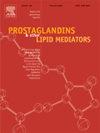益生菌抑制脂肪TGF-β1可缓解实验性多囊卵巢综合征的代谢紊乱
IF 2.5
3区 生物学
Q3 BIOCHEMISTRY & MOLECULAR BIOLOGY
Prostaglandins & other lipid mediators
Pub Date : 2025-03-26
DOI:10.1016/j.prostaglandins.2025.106989
引用次数: 0
摘要
多囊卵巢综合征(PCOS)以代谢和内分泌功能障碍为主要特征,在育龄妇女中诱发代谢综合征和不孕症。脂肪组织功能障碍与代谢综合征的发病机制有关,包括多囊卵巢综合征患者。益生菌是肠道中调节代谢健康的健康细菌。然而,益生菌对脂肪驱动代谢综合征的影响尚未见报道。因此,本研究假设益生菌可能通过抑制TGF-β1来减轻实验性PCOS大鼠模型的代谢紊乱。材料与方法8周龄雌性Wistar大鼠随机分为4组(n = 5)。以来曲唑(1 mg/kg p.o)诱导多囊卵巢综合征21 d,随后给予3 × 109 CFU (p.o)益生菌治疗6周。结果曲唑诱导的多囊卵巢综合征大鼠出现循环睾酮水平升高和多发卵巢囊肿。PCOS大鼠体重增加,同时伴有胰岛素抵抗、高胰岛素血症、瘦素升高,脂联素和脂肪TG降低,脂肪脂肪酶升高。PCOS动物炎症标志物(NF-kB、TNF-α)升高,抗氧化防御(GSH)减少。与对照组相比,PCOS大鼠脂肪TGF-β1、caspase-6和HDAC2水平显著升高。PCOS大鼠脂肪组织免疫组化评价也显示NLRP3严重表达,并伴有TGF-β1水平升高。然而,在PCOS模型中,益生菌治疗逆转了这些异常的全身和脂肪组织变化。结论益生菌通过抑制TGF-β1依赖通路对PCOS模型代谢紊乱具有治疗作用。本文章由计算机程序翻译,如有差异,请以英文原文为准。
Suppression of adipose TGF-β1 by probiotics alleviates metabolic disturbance in experimentally induced PCOS
Background
Polycystic ovarian syndrome (PCOS) is critically characterized with metabolic and endocrine dysfunctions, precipitating metabolic syndrome and infertility in reproductive aged women. Adipose tissue dysfunction has been implicated in the pathogenesis of metabolic syndrome, including in PCOS individuals. Probiotics are healthy bacteria in the gut that regulate metabolic health. However, the impact of probiotics on adipose-driven metabolic syndrome has not been reported. The present study therefore hypothesized that probiotics would attenuates metabolic disturbance in experimental PCOS rat model, probably by suppression of TGF-β1.
Materials and methods
Eight-week-old female Wistar rats were randomly allotted into four groups (n = 5). Administration of letrozole (1 mg/kg p.o) for 21 days induced PCOS, thereafter the animals were treated with 3x109 CFU (p. o) of probiotics for six weeks.
Results
Letrozole-induced PCOS rats were characterized with elevated circulating testosterone, and multiple ovarian cysts. In addition, rats with PCOS developed increased body weight, which was also accompanied with insulin resistance, hyperinsulinemia, and increased leptin, and decreased adiponectin and adipose TG, as well as elevated adipose lipase. Inflammatory markers (NF-kB, TNF-α) were elevated, while antioxidant defense (GSH) was depleted in PCOS animals. A significant increase in adipose TGF-β1, caspase-6 and HDAC2 levels was observed in PCOS rats when compared with the control. Immunohistochemical evaluation of adipose tissue also showed severe expression of NLRP3 in PCOS rats and these changes were accompanied by increased level of TGF-β1. However, treatment with probiotics reversed these aberrant systemic and adipose tissue changes in PCOS model.
Conclusion
The present results suggest the therapeutic benefit of probiotics against metabolic disturbance in PCOS model through suppression of TGF-β1-dependent pathway.
求助全文
通过发布文献求助,成功后即可免费获取论文全文。
去求助
来源期刊

Prostaglandins & other lipid mediators
生物-生化与分子生物学
CiteScore
5.80
自引率
3.40%
发文量
49
审稿时长
2 months
期刊介绍:
Prostaglandins & Other Lipid Mediators is the original and foremost journal dealing with prostaglandins and related lipid mediator substances. It includes basic and clinical studies related to the pharmacology, physiology, pathology and biochemistry of lipid mediators.
Prostaglandins & Other Lipid Mediators invites reports of original research, mini-reviews, reviews, and methods articles in the basic and clinical aspects of all areas of lipid mediator research: cell biology, developmental biology, genetics, molecular biology, chemistry, biochemistry, physiology, pharmacology, endocrinology, biology, the medical sciences, and epidemiology.
Prostaglandins & Other Lipid Mediators also accepts proposals for special issue topics. The Editors will make every effort to advise authors of the decision on the submitted manuscript within 3-4 weeks of receipt.
 求助内容:
求助内容: 应助结果提醒方式:
应助结果提醒方式:


